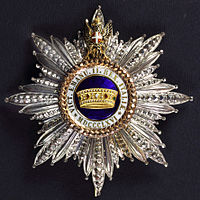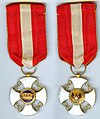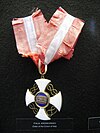Order of the Crown of Italy
| Order of the Crown of Italy Ordine della Corona d'Italia | |
|---|---|
 Star of the Grand Cordon set of the Order | |
| Awarded by The Head of the Italian Royal Family | |
| Type | Dynastic Order of Knighthood |
| Established | 20 February 1868 |
| Royal house | House of Savoy |
| Eligibility | Military, civilian |
| Awarded for | Meritorious Service or Achievement |
| Status | Rarely constituted |
| Founder | King Victor Emmanuel II |
| Grand Master | Prince Emanuele Filiberto, Prince of Venice |
| Chairman of the Council | Vacant |
| Grades | Knight Grand Cross Grand Officer Commander Officer Knight |
| Precedence | |
| Next (higher) | Royal Order of Saints Maurice and Lazarus |
| Next (lower) | Royal Civil Order of Savoy Royal Military Order of Savoy |
Ribbon bar | |
The Order of the Crown of Italy (Italian: Ordine della Corona d'Italia or OCI) was founded as a national order in 1868 by King Vittorio Emanuele II, to commemorate the unification of Italy in 1861.[1] It was awarded in five degrees for civilian and military merit. Today the Order of the Crown has been replaced by the Order of Merit of Savoy and is still conferred on new knights by the current head of the house of Emanuele Filiberto, Prince of Venice.
The order has been suppressed by law since the foundation of the Republic in 1946. However, Umberto II did not abdicate his position as fons honorum and it remained under his Grand Mastership as a dynastic order. While the continued use of those decorations conferred prior to 1951 is permitted in Italy, the crowns on the ribbons issued before 1946 must be substituted for as many five pointed stars on military uniforms.[2]
Grades
The various degrees of the order, with corresponding ribbons, were as follows:
Insignia
 | ||||
| Medals | ||||
|---|---|---|---|---|
 |
 |
 |
 |
 |
| Kingdom of Italy | ||||
| Italian Republic and Savoy House | ||||
Members
Members of the order have included:
- Isaac Artom (1829–1900), Italian writer diplomat, and politician
- Harry Woodburn Blaylock (1878–1928), Canadian lawyer and businessman[3]
- Aaron Bradshaw Jr. (1894–1976), United States Army; World War II, commanded anti-aircraft forces of U.S. Fifth Army
- John Buchan (1875–1940), Scottish novelist and diplomat
- Vice Admiral Felice Napoleone Canevaro (1838–1926), Italian admiral and diplomat
- Sydney Wentworth Carroll (1877-1958), theatrical producer, after production of Napoleon: The Hundred Days, written by Benito Mussolini[4][5][6]
- Major-General Walter Clutterbuck (1894–1987), British Army, World War II
- Admiral Angelo Ugo Conz (1871-1948), Italian Navy, World War I, Italian Admiral and Senator
- Adolf von Deines (1845–1911), Prussian diplomat and General of the Cavalry
- Arthur Conan Doyle (1859–1930), Scottish statesman and Sherlock Holmes author
- Commander Sir Thomas Fisher, RN, British naval officer, managing director of the Canadian Pacific Steamship Company
- James Whitelaw Hamilton (1860–1932), Scottish artist, member of the Royal Scottish Academy
- William Ernest Powell Giles (1835–1897), Australian explorer and gambler
- Thomas Hanbury (1832–1907), English philanthropist and creator of the Giardini Botanici Hanbury
- Major General James Murray Robert Harrison DSO, CB (1880–1957), Royal Artillery, British Army, in recognition of services on the Italian front during World War I
- Vice Admiral Jules James (1885–1957) Commander, U.S. Naval Forces, Mediterranean at the close of World War II, decorated by the last King of Italy, Umberto II during his 34-day reign in 1946
- Rear Admiral Katō Hiroharu (Grand Officer in 1920), Imperial Japanese Navy[7]
- Major General Clayton P. Kerr (1900–1977), United States Army general, World War II member of the Allied mission to the Italian Royal Army
- Edward King, Viscount Kingsborough, in recognition of his work in researching and compiling his 'Antiquities of Mexico'
- Giovanni Marinelli (1879–1944), Italian Fascist politician
- Major General Robert A. McClure (1897–1957), father of U.S. Army Special Operations, Director of Information and Media Control at Supreme Headquarters Allied Expeditionary Force (SHAEF) during World War II
- Brigadier General Billy Mitchell (1879–1936), United States Army air power advocate
- Cesare Nava (1861–1933), Italian politician
- Edwin B. Parker (1868–1929), American lawyer and politician, member of the War Industries Board and arbiter with Germany, Austria, and Hungary following World War I[8]
- Charles Poletti (1903–2002), American lawyer and politician, Governor of New York, and colonel in the United States Army; served in Italy during World War II
- John Rylands (1801–1888), English entrepreneur and philanthropist
- Most Reverend Pietro Sfair (1888-1974), Titular Archbishop of Nisibis dei Maroniti and Council Father at the Second Vatican Council
- Alfred T. Smith (1874–1939), U.S. Army brigadier general[9]
- Alexander William Stewart (1868–1933), Scottish naval architect, engineer, and inventor
- Rear Admiral Yates Stirling Jr. (1872–1948), United States Navy sea power advocate
- General Sebastiano Visconti Prasca (1883–1961), Italian Royal Army
- William Verbeck "WILLIAM VERBECK, EDUCATOR, IS DEAD; General and Former Commander of New York National Guard, Succumbs at 69.HEADED MANLIUS SCHOOL In 1927 He Was Made Commander of Crown of Italy--Received Citizenship by Legislative Act". The New York Times. 1930-08-25. ISSN 0362-4331. Retrieved 2019-11-24.</ref>
- Giacomo Vuxani (1886–1964), Italian politician and patriot
- Brigadier General George H. Weems, United States Army, World War II
- Major General Arthur R. Wilson (1894–1956), United States Army, World War II, commanded Coastal Base Section in Naples
- Russell Wilson (1876–1946), four-term mayor of Cincinnati, Ohio
- Horatio Herbert Kitchener (1850-1916), Field Marshal in the British Army
Order of Merit of Savoy
The Order of Merit of Savoy was founded by Vittorio Emanuele, Prince of Naples, on 23 January 1988, „within the framework of the Civil Order of Savoy“. Current Grand Master is Emanuele Filiberto, Prince of Venice.[10]
The insignia are the same as those of the Civil Order, but with the white vitreous enamel of the Order of the Crown. The ribbon is blue with a broad white centre stripe.
The order has the same classes as the Order of the Crown, additionally a Gold Cross of Merit and a Silver Cross of Merit is awarded below the Knight's cross.
Recipients (amongst others)
As of the year 2000 there are/were 1453 recipients of the Order of Merit.[11]
- Emanuele Filiberto of Savoy, Prince of Venice, Knight Grand Cross
- Clotilde Courau, Princess of Venice
- Princess Vittoria of Savoy, Princess of Carignano Marchioness of Ivrea
- Princess Luisa of Savoy
- Marina Doria, Princess of Naples and Duchess of Savoy
- Princess Maria Pia of Bourbon-Parma
- Princess Maria Gabriella of Savoy
- Princess Maria Beatrice of Savoy
- Prince Dimitri of Yugoslavia
- Prince Michael of Yugoslavia
- Prince Sergius of Yugoslavia
- Princess Helen of Yugoslavia
- Nicholas, Crown Prince of Montenegro
- Prince Carlo, Duke of Castro
- Mariano Hugo, Prince of Windisch-Graetz Knight Grand Cross
- Prince Don Alessandro Jacopo Boncompagni Ludovisi Altemps Knight Grand Cross
- Marquess Paolo Thaon di Revel Vandini Knight Grand Cross
- Baron Enrico Sanjust dei Baroni di Teulada Knight Grand Cross
- Prof. Alberto Bochicchio Knight Grand Cross
- Count Carlo Buffa dei Conti di Perrero Knight Grand Cross
- Count Giuseppe Rizzani Knight Grand Cross
- Rudy Giuliani Knight Grand Cross
- Giovanni Cheli Knight Grand Cross
- Duke Giancarlo Melzi d'Eril Knight Grand Cross
- Count Andrea Boezio Bertinotti Alliata
- Andrea Rivoira Knight Grand Cross
- Antonio d’Amelio Knight Grand Cross
- Franca Sciaraffia Dame Grand Cross
- Nicolas Gagnebin Knight Grand Cross
- Theo Niederhauser Knight Grand Cross
- Monsignor Paolo de Nicolò Knight Grand Cross
- Alberto Di Maria
- Dame Zina Losapio
- Alessandro Santini
- Gino Lupini
- Marco Bocchio
- Alberico Guerzoni
- Alberto Coluccia
- Simone Balestrini
- Giovanni Cheli
- Francesco Ruffini
See also
References
- ^ Founded by Royal Decree No. 4251 of 20 February 1868, renewed by Royal Decree No. 4850 of 24 January 1869, Royal Magistral Decree of 17 November 1907 and Royal Decree No. 276 of 16 March 1911
- ^ Ordini Cavallereschi del Regno d'Italia Archived 2006-05-07 at the Wayback Machine Corpo della Nobiltà Italiana (retrieved 10 September 2009)
- ^ Tremblay, Yves (2005). "BAYLOCK, HARRY WOODBURN". Dictionary of Canadian Biography. Vol. 15. University of Toronto/Université Laval. Retrieved 28 September 2018.
- ^ Yorkshire Evening Post, 10 March 1933, p. 10, col. 5.
- ^ Illustrated London News, 30 September 1933, p. 34, col. 2.
- ^ Daily Herald, 13 January 1941, p. 2, cols. 2–3.
- ^ "Orders and Decorations, 1920" (in Japanese). p. 2.
- ^ "Judge E. B. Parker, Debt Expert, Dies". The Evening Star. 1929-10-30. p. 1. Retrieved 2024-01-13 – via Newspapers.com.

- ^ "Brig. Gen. A. T. Smith Dies After Illness of Four Days". The Evening Star. Washington, DC. November 28, 1939. p. 2 – via GenealogyBank.com.
- ^ "REGISTERS". International Commission for Orders of Chivalry (in Italian). Retrieved 2022-09-22.
- ^ "Zoppi, Count Vittorio, (23 Feb. 1898–6 May 1967), Knight Grand Cross Ordine al Merito della Repubblica Italiana", Who Was Who, Oxford University Press, 2007-12-01, doi:10.1093/ww/9780199540884.013.u48869, retrieved 2022-09-20










